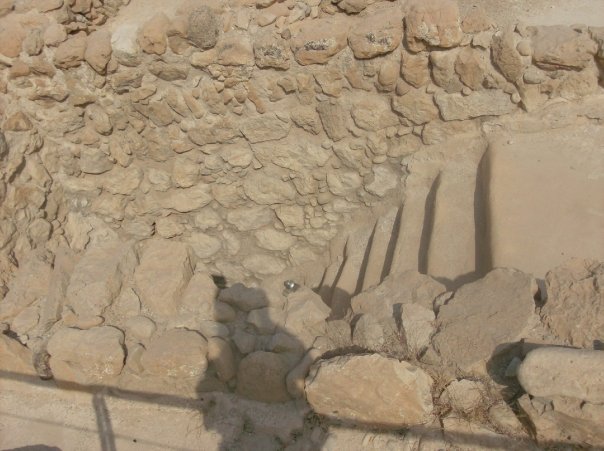
The argument for the “Oral Law” is that one of the components of the “Oral Law” is the laws given to Moshe at Sinai. Rambam argues that the Yisraelites heard these instructions from Moshe and they in turn passed these instructions onto their children.1
Rambam gives us a list of thirty “Oral Laws” that were given to Moshe ha-navi at Har Sinai.2
Measurement of oil
1. Measurement of oil for the thanksgiving offering
Now this is the Instruction for the slaughter-offering of shalom that is brought near for the Eternal One : if (it is) on account of thanksgiving that he brings it near, he is to bring near along with the slaughter-offering of thanksgiving: matza cakes, mixed with oil, matza wafers smeared with oil, and flour well-stirred into cakes mixed with oil. (Vayikra 7:12)3
We see from this verse that the thanksgiving offering should be “mixed” with oil and “smeared” with oil. There is no indication that there must be an exact measurement of oil that is “mixed” or “smeared” in/on the unleavened bread.
2. Measurement of oil for the offering given at the end of the term of a Nazirite;
Now this is the Ritual Instruction for the Consecrated-One: On the day that one’s days of being consecrated are fulfilled, one is to be brought to the entrance of the Tent of Appointment…a basket of matzot of flour, round-loaves mixed with oil, wafers of matzot spread with oil, (as well as) their grain-gift and their poured-offerings. (Bamidbar 6:13, 15)3
We see from this verse that the Nazirite offering should be “mixed” with oil and “spread” with oil. There is no indication that there must be an exact measurement of oil that is “mixed” or “spread” in/on the unleavened bread.
Nidah
3. A woman is tahor during the eleven days between the two nidah periods;
A woman – when she is one-with-a-flow, her flow being of blood from her “flesh,” seven days shall she remain in her (state of) being-apart. Anyone who touches her is to remain tamei until sunset. … Now when she is purified from her flow, she is to number seven days, and afterward, she becomes pure. An on the eighth days she is to take herself two turtledoves or two young pigeons and is to bring them to the priest, to the entrance of the Tent of Appointment. The priest is to sacrifice the one as a hattat-offering and the other as an offering-up, the priest is to effect-purgation for her before the presence of the Eternal One , from her tamei flow. (Vayikra 15: 19, 28-30)3
As can be plainly seen from the Torah a woman is unclean for seven days and on the eighth day if she sees no further issuance of blood then she is clean. There is no indication in the Torah that there are eleven days where a woman is tahor.
Architecture
4. Length of a wall when conforming to certain standards;
5. Space less than three t’fahim wide in a solid surface;
6. A ceiling being a bent continuation of the wall;
Simply put, where is there anywhere in the Tanakh that certain standards for walls, solid surfaces, and ceilings mentioned outside of the Mishkan and Beit HaMikdash (and their accompanying items)? In the case of the Mishkan and Beit HaMikdash there are specific measurements that would have been understood by the Yisraelites without any “Oral Law.”
Blessing over food
7. Minimum amount of food needed for a baracah;
…when you eat, and you are satisfied, you are to bless the Eternal One your God for the good land that he has given you. (Devarim 8:10)3
We are told quite simply in the Tanakh that we are to bless God for the good of the land after we eat and are satisfied. It is really quite simple. There is no minimum amount needed as long as the person is satisfied.
Mikveh
8. Minimum dimension that constitutes a separation of the body and the mikveh water;
Now when the one-with-a-flow is purified from his flow, he is to number himself seven days of being pure; when he scrubs his garments and washes his flesh in living water, then he is pure. (Vayikra 15:13)3
Simply put, a man (and women in some circumstances) is to immerse in living water. It states that he is to bathe his flesh which means that he shall not have anything separating his body from the living water. There is no need for an “Oral Law” to understand a very simple process of ritual purification.
Construction
9. Minimum dimensions of a wall;
Simply put, where is there anywhere in the Tanakh that certain standards for walls mentioned outside of the Mishkan and Beit HaMikdash (and their accompanying items)? In the case of the Mishkan and Beit HaMikdash there are specific measurements that would have been understood by the Yisraelites without any “Oral Law”.
———————-
1Naftali Silberberg. “What is the ‘Oral Torah?’” chabad.org. Chabad, n.d., accessed 15 April 2012. [http://www.chabad.org/library/article_cdo/aid/812102/jewish/What-is-the-Oral-Torah.htm]
2Zvi Lampel, trans. Maimonides’ Introduction to the Talmud. New York: The Judaica Press, Inc., 1998.
3Everett Fox. The Five Books of Moses. New York: Schocken Books, 1997.
4Melech ben Ya’aqov. “What is the Sabbath?” karaiteinsights.com. Karaite Insights, n.d., accessed 15 April 2012. [http://www.karaiteinsights.com/article/shabbat.html]
